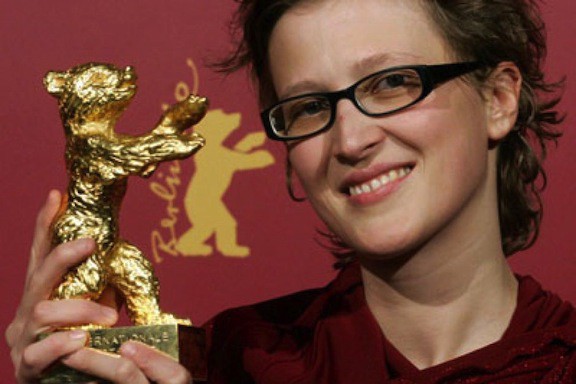Quota is a dirty word in our supposed meritocracy. But it’s a less contentious, even normal, practice in other parts of the world. Sweden, for example, recently mandated that “funding shall be divided equally between women and men in the key positions of director, screenwriter and producer in those projects which receive funding from the [state-sponsored] Swedish Film Institute.” New Zealand filmmaker Jane Campion has also called for quotas, declaring that, as matter of social justice, “Half of the films in the world must be directed by women.”
Now the Berlinale-winning Bosnian director Jasmila Zbanic (Grbavica, For Those Who Can Tell No Tales) has spoken out on the topic. At the inaugural Femme du Cinema awards at the Les Arcs European Film Festival, Zbanic used her time at the podium to echo the importance of having women directors behind the camera while expressing caution at allowing “someone else [to] deal with the politics in our name.”
Here’s Zbanic’s impassioned acceptance speech for the Femme du Cinema award (emphasis added):
When I go to a cinema, I don’t care if the film is
made by a man or a woman as long as it tells me a story, as long as it offers
pictures that shed light on my existence, characters I can identify with, jokes
I can laugh at.
Unfortunately, not many films do, and some films
offend me as they portray old-fashioned and sometimes fascistic images of women
which I cannot identify with, and most definitely cannot laugh at.
Film is the most liberal of arts and, at the same time,
it can be a very conservative art. Money that is involved in filmmaking is
distributed mostly to men, thus creating a celluloid ceiling for women. A US research
shows that only 9% of woman share in this cake and are allowed to tell their
stories, though woman comprise 50% of audience in cinemas, and they/WE are not
happy with what we see.
As a filmgoer and a filmmaker I want to participate
and tell stories of woman and man that will move us forward. I want to create
films that will speak to different parts of our hearts and brains, stories told
from a different angle.
Jane Campion said, “We should mandate that 50% of
films produced are made by women. That would be possible with public money.
Instantly, the culture would change. It can be done.”
She also gave advice to young
female filmmakers: “Please do not play the lady card. Don’t
feel sorry for yourself. Just do your work and let someone else deal with the
politics.”
I totally agree with the part about NOT feeling sorry for yourself and
doing your work and not playing the lady card. But unfortunately I don’t know who
that other authority might be, that Someone else who will deal with the politics
in our name.
We shouldn’t give our husbands and fathers the right to represent us, we
have friends like people from Les Arcs festivals, Sisley, Elle (who are
involved in this award) to support us, but the main work is still on us. We
should do it with love and dignity, and not feeling sorry for ourselves, but we
should demand a change in how women are portrayed in films, demand our right to
share our stories, our passions, needs, fantasies, jokes that we can laughs at –
not being pissed off. Because — guys — it’s not funny!
Since the United States lacks a government foundation that supports filmmaking, a quota system isn’t a relevant policy matter here. But it excites us to hear of the burgeoning demand for equal opportunities for women directors (as well as compelling, feminist arguments against), since it means that more people are recognizing that there’s a societal problem in having mostly men create and shape our popular culture, while also rightly worrying about relinquishing political control to others.







